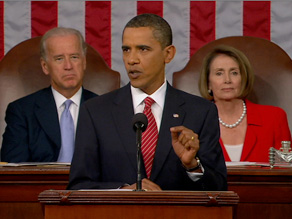So why didn't the Democrats pass prison reform again?

When Obama Had “Total Control of Congress”
https://www.beaconjournal.com/article/
They didn't want to
Side Score: 13
|
 |
It wasn't important to them
Side Score: 16
|
|
|
|
|
1
point
President Obama Signs the Fair Sentencing Act https://obamawhitehouse.archives.gov/ Side: They didn't want to
1
point
In 2010, reversed the Department of Justice’s previous charging policy – known as the “Ashcroft memo” – that required prosecutors to always charge crimes with the severest possible sentence, and instead instructed that cases should be charged based on the individual circumstances of the offense. Reversed back under Sessions/Trump Side: They didn't want to
1
point
Deprioritized federal enforcement of low-level drug crimes, especially in states that passed decriminalization statutes. Reversed by Sessions/Trump https://www.justice.gov/opa/pr/ Side: They didn't want to
1
point
Created the Task Force on 21st Century Policing Side: They didn't want to
1
point
established the My Brother’s Keeper initiative aimed at mentoring and other ways to keep people from going to jail in the first place Side: They didn't want to
1
point
established Smart on Juvenile Justice grants to develop statewide strategies to ensure that every youth involved with the juvenile justice system has fair and equal access to quality legal representation. https://njdc.info/ Side: They didn't want to
|
1
point
Obama was the first president in decades to leave office with a smaller federal prison population https://www.vox.com/policy-and-politics/ Side: It wasn't important to them
1
point
He issued more commutations than the past 13 presidents combined. "The vast majority of these men and women are serving unduly long sentences for drug crimes" Side: It wasn't important to them
1
point
Obama was the first president in decades to leave office with a smaller federal prison population This is what your link actually says, you unbalanced partisan troll:- It’s in large part due to a decision by the US Sentencing Commission, an independent judicial agency, to guide judges to give more lenient sentences for drug crimes, both retroactively and in the future. Side: They didn't want to
1
point
Did you deliberately omit the next paragraph, or just not have the attention span to get that far? "The Obama administration also took executive actions to cut the prison population. Obama has granted pardons and commutations to 1,324 inmates so far — the most of any president since Harry Truman in the late 1940s and early ’50s. And former Attorney General Eric Holder launched the Smart on Crime Initiative that, among other changes, told federal prosecutors to charge and lock up fewer low-level drug offenders." https://www.vox.com/policy-and-politics/ Side: It wasn't important to them
1
point
Also: - Congress could have blocked the changes, but didn't (several Republicans opposed them). - The Commission voted for the change based in part on testimony from Eric Holder. - 4 of 7 members of the Commission that approved the changes were nominated by Obama (Ketanji Brown Jackson, Patti B. Saris, William H. Pryor Jr, Rachel E. Barkow) https://www.ussc.gov/about/who-we-are/ Side: It wasn't important to them
1
point
In 2010, the Department of Justice issued unprecedented rules to provide criminal defendants with broad, comprehensive pre-trial evidence - more than the law requires. As part of the Access to Justice Initiative launched in 2010, the Department has been engaging with a wide variety of new partners – including state, local, tribal, and federal officials, nonprofit organizations, researchers, and experts from across the private sector – to expand research and funding support for the delivery of indigent defense services and to protect the Sixth Amendment guarantee to effective assistance of counsel. In May 2014, the Department announced that its federal agents would be required to videotape interrogations of detained individuals in order to ensure suspects’ civil rights are respected during all interviews. In September 2014, a new Department-wide policy was put in place that directed federal prosecutors to no longer require, as a part of plea agreements, that defendants waive their right to appeal based on ineffective assistance of counsel. In December 2014, the Department issued updated profiling guidance that, among other things, expanded the prohibition to religion, national origin, sexual orientation and gender identity and was applicable to state and local law enforcement agencies working on federal task forces. Side: It wasn't important to them
1
point
In 2012, the Equal Employment Opportunity Commission (EEOC) issued historic anti-discrimination guidance recommending that employers avoid blanket bans on job applicants with a criminal history because of the potential disparate impact on people of color. The guidance states a criminal record should only bar someone from employment when the conviction is closely related to the job, after considering (1) the nature of the job, (2) the nature and seriousness of the offense, and (3) the length of time since it occurred. The U.S. Department of Labor (DOL) built on the EEOC policy with (a) guidance geared to the public workforce system, and (b) a directive for federal contractors about their obligations regarding the use of criminal records as an employment screen. DOL also launched the Linking to Employment Activities Pre-release (LEAP) program, a pilot initiative that provides specialized services to prepare incarcerated individuals for employment and increase their opportunities for successful reentry upon release. The U.S. Department of Housing and Urban Development (HUD) sent a letter to public housing authorities in 2011 encouraging them to allow people with criminal records to rejoin their families in public housing programs, when appropriate. The Office of Personnel Management (OPM) developed a best practices guide regarding contractor applicants who support Federal agencies. The Small Business Administration (SBA) proposed to amend their eligibility rules for MicroLoans, so that people on probation and parole are not automatically excluded. The Federal Trade Commission (FTC) has taken cases and published documents for job seekers about their rights under the Fair Credit Reporting Act when it comes to background checks. In 2015, the U.S. Department of Education issued a letter to campus financial aid professionals to clarify that otherwise eligible youth who are confined in juvenile justice facilities are eligible to receive Federal Pell Grants. NIJ (prior to the Council’s formation) funded a project with the American Bar Association which identified 46,000 statutes and regulations that impose collateral consequences on those with a conviction, creating barriers to employment, housing, benefits, and voting. In 2011, then-AG Holder wrote to every state Attorney General, asking them to assess their state’s statutes and policies to determine if any should be eliminated. In 2013, DOJ directed leadership across the Department to take collateral consequences into account when proposing any new regulation or guidance. The Department of Veterans Affairs (VA) revised its administrative polices that limited VA prison outreach to the six months prior to release. Reentry assessment and planning can now begin day one, thus enhancing the odds of successful reentry. The VA also expanded eligibility for its health care services to those who are in halfway house settings and built a web-based system that allows prison, jail, and court staff to quickly and accurately identify Veterans among their populations. Side: It wasn't important to them
|


